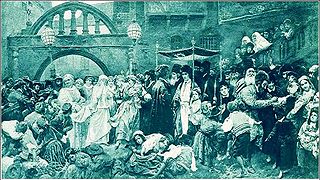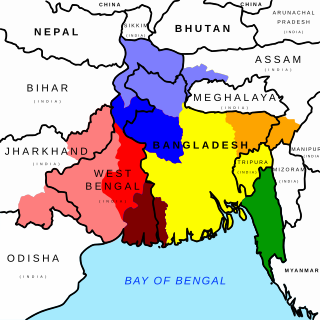
A wedding is a ceremony in which two people are united in marriage. Wedding traditions and customs vary greatly between cultures, ethnicities, races, religions, denominations, countries, social classes, and sexual orientations. Most wedding ceremonies involve an exchange of marriage vows by a couple; a presentation of a gift ; and a public proclamation of marriage by an authority figure or celebrant. Special wedding garments are often worn, and the ceremony is sometimes followed by a wedding reception. Music, poetry, prayers, or readings from religious texts or literature are also commonly incorporated into the ceremony, as well as superstitious customs.

Sado is a city located on Sado Island in Niigata Prefecture, Japan. Since 2004, the city has comprised the entire island, although not all of its total area is urbanized. Sado is the sixth largest island of Japan in area following the four main islands and Okinawa Island. As of June 1, 2023, the city has an estimated population of 48,195 and a population density of 56.3 inhabitants per square kilometre (146/sq mi). The total area is 855.69 square kilometres (330.38 sq mi).

A groomsman or usher is one of the male attendants to the groom in a wedding ceremony. Usually, the groom selects close friends and relatives to serve as groomsmen, and it is considered an honor to be selected. From his groomsmen, the groom usually chooses one to serve as best man.

Felix Mendelssohn's "Wedding March" in C major, written in 1842, is one of the best known of the pieces from his suite of incidental music to Shakespeare's play A Midsummer Night's Dream. It is one of the most frequently used wedding marches, generally being played on a church pipe organ.

Music is often played at wedding celebrations, including during the ceremony and at festivities before or after the event. The music can be performed live by instrumentalists or vocalists or may use pre-recorded songs, depending on the format of the event, traditions associated with the prevailing culture and the wishes of the couple being married.

A Jewish wedding is a wedding ceremony that follows Jewish laws and traditions. While wedding ceremonies vary, common features of a Jewish wedding include a ketubah that is signed by two witnesses, a chuppah or huppah, a ring owned by the groom that is given to the bride under the canopy, and the breaking of a glass.

The traditional Vietnamese wedding is one of the most important ceremonies in Vietnamese culture, which is influenced by Confucian and Buddhist ideologies.

Scientology and marriage, within the Church of Scientology, are discussed in the book The Background, Ministry, Ceremonies & Sermons of the Scientology Religion.

A Bengali Muslim wedding is a Bengali wedding in accordance with the Muslim faith. It includes rituals and ceremonies that may span up to three days. In most cases, it starts with the Dekha Dekhi, followed by the nikah, which is conducted by a Qazi with a fixed denmohor. It ends with the Bou Bhat ceremony, which is popular as the wedding reception arranged by the groom's family. This is the dominant tradition of weddings seen among the Bengali Muslims of Bangladesh and the West Bengal state of India.

Punjabi wedding traditions are a strong reflection of Punjabi culture with ritual, song, dance, food, and dress that have evolved over centuries.

"International Players Anthem (I Choose You)" is a song by American hip hop duo UGK, released on June 6, 2007, as the second single from their fifth studio album Underground Kingz (2007). The song, produced by DJ Paul and Juicy J of Three 6 Mafia, features verses from fellow Southern hip hop duo Outkast.
"A Nice Day for a Posh Wedding" is the seventh episode of the second season of the American television comedy drama Ugly Betty and the series's 30th episode overall. It was written by Silvio Horta and Marco Pennette, and directed by James Hayman. The episode was originally broadcast on ABC in the United States on November 8, 2007. Ugly Betty centers on Betty Suarez's job at the fashion magazine MODE, despite not fitting their expectations of beauty and style. In this episode, MODE's creative director Wilhelmina Slater attempts to marry the magazine's publisher Bradford Meade.

Yi San, also known as Lee San, Wind of the Palace, is a 2007 South Korean historical drama, starring Lee Seo-jin and Han Ji-min. It aired on MBC from September 17, 2007 to June 16, 2008 on Mondays and Tuesdays at 21:55. The series was directed by Lee Byung-hoon, who also created the award-winning television series Dae Jang Geum.

MM! is a Japanese light novel series by Akinari Matsuno, with illustrations provided by the group QP:flapper made up of Tometa Ohara and Koharu Sakura. Media Factory published 12 novels under their MF Bunko J imprint between February 2007 and September 2010, including two side story volumes. The series was left unfinished due to the author's death on April 18, 2011. A manga adaptation by Issei Hyoju was serialized between the September 2008 and February 2012 issues of Media Factory's Monthly Comic Alive. A drama CD adaption was released by Edge Records on March 24, 2010 and its first-press limited edition came with a bonus CD. A 12-episode anime adaptation produced by Xebec aired between October and December 2010. Sentai Filmworks released the anime series on English-subtitled DVD in North America in September 2011, and then re-released it in February 2014 with an English dub on both DVD and Blu-ray.
The culture of Mangalorean Catholics has been shaped by their Christianisation in Goa, their migrations& their captivity. They adopted elements of the local Mangalorean culture, but retained many of their Konkani customs and values. The ethnic Mangalorean houses of the older generation have spacious porticos, red oxide cemented floors, terra cotta roofs layered with the once famous Mangalore tiles. The houses are usually accompanied by their own private wells or ponds, and are normally attached to orchards of coconut trees, jackfruit trees, ice apple trees, Alphonso mango trees, areca nut trees etc.
Attire of Mangalorean Catholics refers to the traditional clothing of the Mangalorean Catholics from the Mangalore Diocese on the southwestern coast of India.
Lady Hyegyŏng of the Pungsan Hong clan, also known as Queen Heongyeong, was a Korean writer and Crown Princess during the Joseon period. She was the wife of Crown Prince Sado and mother of King Jeongjo. In 1903, Emperor Gojong gave her the posthumous name of Heongyeong, the Virtuous Empress.

The Throne is a 2015 South Korean historical drama film directed by Lee Joon-ik, starring Song Kang-ho and Yoo Ah-in. Set during the reign of King Yeongjo, the film is about the life of Crown Prince Sado, the heir to the throne who was deemed unfit to rule and, at age 27, was condemned to death by his own father by being locked in a rice chest for eight days.
Weddings in Myanmar, considered auspicious occasions in Burmese culture, reflect various ethnic, religious, and regional traditions. Depending on an individual's family social economic status, personal preferences and titles held, Burmese weddings can be religious or secular, and extravagant or simple. Wedding expenses are covered by the groom's family. Myanmar is a predominantly Buddhist country, and many wedding customs and traditions are influenced by Buddhism.













